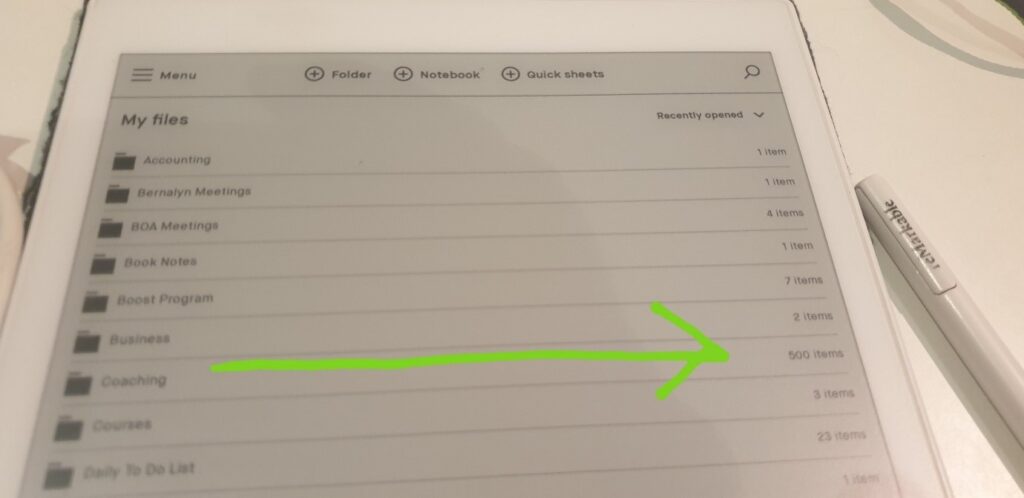Anton Guinea
Entrepreneur, Speaker, bestselling author, and founder of The Guinea Group of Companies. For over 15 years, Anton has helped leaders move their teams to become psychologically safe, physically safe and overall better versions of themselves.

What I learnt in 500 leadership coaching sessions

In January 2020, just before the pandemic whipped up its frenzy, Facebook started sending me ads for a thing called Remarkable. The metaverse must have been listening to my conversations (or maybe just my phone), and must have known that I write a lot, and I have got piles of old books full of notes from meetings and coaching sessions.
The Remarkable looked cool, so I purchased one, and on January 24, 2020, I started documenting my coaching sessions in it, instead of in workbooks. This week, in September 2022, I clocked over 500 coaching sessions, all documented in the Remarkable.
500 one-on-one coaching sessions, sitting with leaders at all levels of organisations, talking through their challenges or their wins. I have coached global managers and CEOs, and I have worked with team leaders. Either face-to-face or online. Either fortnightly or monthly, or weekly (even daily at times).
Our coaching programs offer 24/7 support, which some leaders need at times. Some sessions take 15 minutes, and I have also spent full days with some leaders.
It has been a journey for me, and for the leaders I coach. The learnings on both sides have been amazing, and the conversations are documented, and sent out as part of the close out for every session.
In relation to my reflections, and the common themes that have come through during those 500 sessions, there are three that stand out.

- Leadership can be lonely
In our coaching sessions, I have seen (and experienced) every emotion, and some. And what I’ve learnt about leaders is that things can change in a heartbeat. Life can be humming, and suddenly it gets uncomfortable. And lonely.
Leadership is such a rewarding experience for most, but at the same time, it can present such a challenge. And regardless of how much or how little support the leader is getting from their leader, there are times when leadership can cause feelings of isolation and loneliness.
Big decisions need to be made. Hard conversations must be had. All whilst there are teams and team members involved and impacted by those decisions. It is so easy for a leader to say the wrong word, or use the wrong tone, or the wrong body language, and the relationship with a team or team member is strained for the next period.
My reflection is that leaders need a coach, and someone in their corner, who is external to the organisation, who they can talk openly to, about their challenges. And of course, their wins. Don’t worry, we celebrate success as much as we take through issues, but at the same time, there is a confidentiality with coaching that makes it a hugely supportive process. Where leaders feel like they have got a friend, as well as a coach.
My coaching on this is, if you find leadership lonely, reach out to a coach or mentor (or your leader), and be willing to have real conversations about your leadership and your team. These conversations will help you feel like you are not in this on your own. You are loved and we’re here for you when you need to chat. Life (and leadership) is a team sport.
- Leadership is values based
The clearer that leaders are on their values, the better results they get. Period.
Value alignment is such a key part of leadership because it is the thing that leaders go to consciously when they need to make tough decisions. Yes, our beliefs and conditioning drive our behaviour, but these are more subconscious, and we don’t think about these too much (although we should do that too).
Our values are the behavioural drivers that we go to when we are under pressure. If your values are honesty, you will be driven by telling the truth. It if is caring, you will lean into compassion and empathetic leadership. And if it is integrity, you will be the leader who makes a commitment and follows through (not commits and forgets).
My reflection on this one, is that a lot of leaders haven’t done a values exercise. And aren’t sure on their values. Which makes it difficult for them. In several ways. Firstly, a leaders values need to align with the values of the organisation. It is not uncommon for me to hear a leader leave an organisation because their values aren’t aligned with their business. This shows up with they are asked to do something that ‘doesn’t feel right’. Yes, leaders need to support business decisions, but at the same time, will feel challenged if how they are expected to behave is out of alignment with their caring value or their integrity value, for example.
My next reflection on this one is that if you ask someone about their leader, they will generally talk in values-based words. So, our values are what we are remembered for (because they drive behaviour, and our behaviour is always on show).
And in case you are wondering, what is the one big overarching value that should drive leader behaviour, it’s integrity. We have surveyed teams and asked them what they respect (and expect) from their leaders, and it is integrity. Which means the two elements of integrity – firstly, doing what is right, and secondly, doing what you said you would do.
- Leadership is about control
It is about control, in a good way, not in the power-hungry way. It is about internal control. Or more specifically, conscious control.
We get some great outcomes for the leaders that come through our programs, and I think the biggest compliment I could get is when leaders share that they have learnt the skill of ‘responding, not reacting’. In other words, they have learnt to channel their emotional state, and breathe through the situation.
Leaders that can create conscious control, are able to control their behavioural responses. Which helps them control situations. And to control high pressure situations. Which is when it’s most important to be responsive, not reactive.
Emotional states are contagious. Leaders that can stay calm can help their team members stay calm. Some leaders I have coached have a poker face and try hard not to show when they are struggling emotionally. They try to ‘shield’ their teams from any pressure they might be facing.
The best leaders realise that their teams, and team members are a reflection of their leader. If the leader is reactive, the team members will become that way, too. If the leader is in control, ditto (in general terms at least).
And again, in case you are wondering, one of the character traits that people are looking for from their leaders is consistency. Consistency means that the leaders emotional state isn’t all over the place. It is consistent. Team members don’t like working with leaders who are volatile or erratic. It is just uncool.
Oh, and the other thing which surveys highly from a team member perspective is care factor. Consistency and care factor are the two things your team are looking for from you, in relation to behaviour at least.
Finally, the very first coaching session that I recorded on my Remarkable was David Mallia on January 24, 2020. The 500th coaching session that I recorded on my Remarkable was Jayden Baker, on September 5, 2022. If you do the numbers and count the working days during that period (670), then divide that by 500, you will get about 75%. So on average, I do 3 coaching sessions every 4 working days. That is between 3 and 4 coaching sessions every week, week in and week out.
It has been a blast, and my thanks and gratitude goes out to all the leaders that have trusted me to be in their lives.
Would love to hear your comments on this. Do these three topics resonate with you?
And could you please do me a favour, and share this with leaders everywhere? This is an important topic for leaders.
Or click the image below if you’d like to chat about what leadership means to you.
If you would like to learn more about Anton or The Guinea Group, please click here to book into Anton’s calendar, to:
UPGRADE your Mindset
UPSKILL your Leadership
UPLIFT your Teams
About Anton
Anton has dedicated his working life to helping leaders to upgrade their mindset, upskill their leadership, and uplift their teams! With a focus on helps leaders to better lead under pressure. Anton is an entrepreneur, speaker, consultant, bestselling author and founder of The Guinea Group. Over the past 19 years, Anton has worked with over 175+ global organisations, he has inspired workplace leadership, safety, and cultural change. He’s achieved this by combining his corporate expertise, education (Bachelor of HR and Psychology), and infectious energy levels.
Work With Anton!
Subscribe to our Newsletter
